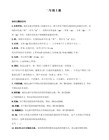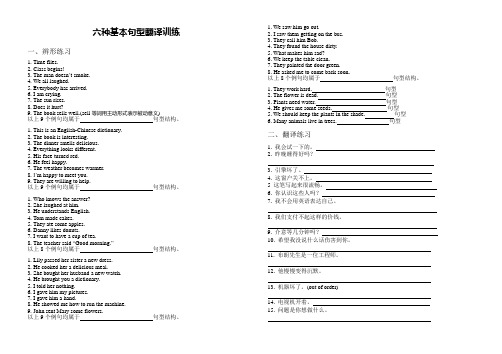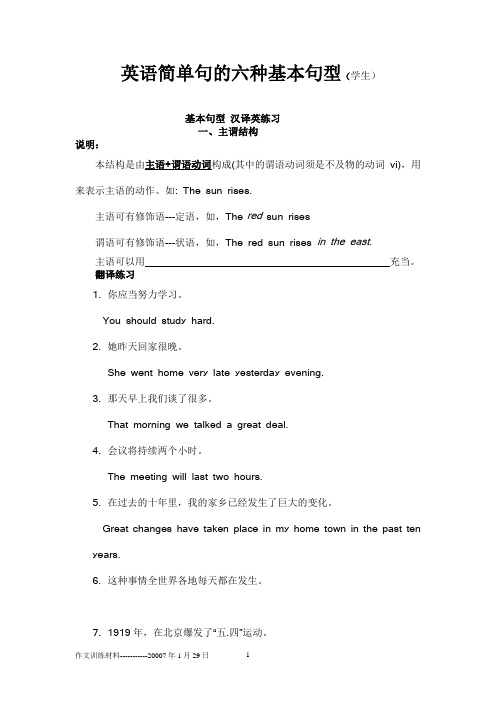六种基本句型结构及练习
- 格式:ppt
- 大小:64.00 KB
- 文档页数:10

简单句的五种基本句型讲解及练习题一、句子成份英语句子成分有主语,谓语,宾语,表语,定语,状语,宾语补足语等。
顺序一般是主语,谓语,宾语,宾语补足语,而表语,定语,状语的位置要根据情况而定。
1、主语:表示句子主要说明的人或事物,一般位于句首。
主语可由名词、代词、数词、不定式、动名词、名词化的形容词和主语从句等表示。
例如:My sister is a teacher.(名词)我的姐姐是老师。
We often speak English in class.(代词)我们经常在课上讲英语。
One-third of the students in this class are girls.(数词)这个班三分之一的学生是女生。
2、谓语:谓语说明主语的动作,状态或特征。
可以有不同的时态,语态和语气。
1)简单谓语:she works in a hospital. 她在一家医院工作。
(动作)2)复合谓语: I can speak a little English. 我会说一点英语。
We are reading books. 我们正在读书。
He has gone to Beijing.他已经去北京了。
3、表语: 它位于系动词(比如be)之后,说明主语身份,特征,属性或状态。
My sister is a teacher.(我的姐姐是老师。
)The weather has turned cold.(天气已经变冷了。
)系动词:是用来帮助说明主语的动词,不能单独用作谓语,其后必须跟表语,如:be, become, turn, look, go等。
4、宾语: 宾语表示动作行为的对象,跟在及物动词之后。
We like English. 我喜欢英语。
They helped the old with their housework yesterday.(名词化形容词)有些及物动词可以带两个宾语,往往一个指人,一个指物,指人的叫间接宾语,指物的叫直接宾语。

简单句的六种基本句型和句子成分练习题一、选择填空:( )1.six years since I began to study English.A. It isB. I have beenC. There areD. It was( )2.in the room at that time.A. Nobody wasB. Someone wereC. Who isD. He are( )3. It v ery noisy outside.is going on?A. WhoB. WhatC. WhichD. Where( )4.in English in class every day is important.A. SpeakB. TalkingC. SayingD. To tell( )5. There must be near the factory.A. a book storeB. book storeC. books storeD. books stores( )6. Although it's raining hard,are still working in the fields.A. but theyB. and theyC. theyD. since they( )7. The doctor as well as the nurses great concern for the patients.A. showB. showsC. have shownD. are showing( )8. Your son must be a clever boy,he?A. isB. isn'tC. mustD. mustn't( )9. The computer center,last year, is very popular among students in this school.A. openB. openingC. openedD. being opened( )10. I go to the shop today, for there is a lot of food at home.A. mustn'tB. had toC. can'tD. needn't( )11.—You won't go to the Summer Palace tomorrow. 一will I.A. AlsoB. TooC. NeitherD. Either()12. — Do you enjoy your life here, Mr. Durham?— Yes, of course, though I here for only two weeks.A. stayB. am stayingC. had stayedD. have stayed()13. We are in class. You ' d better.A. not talkB. not to talkC. not talkingD. don ' t talk()14. The actor at the age of 70. A. dead B. died C. was dead D.has been dead( )15.were all very tired, but none of would stop to take a rest.A. We, usB. Us, weC. We, ourD. We, we( )16. I think necessary to learn English well.A. itsB. itC. thatD. that is( )17. —Where do you live in Melbourne? — Let me you on the map.A. giveB. teachC. bringD. show( )18. I will never forget the day I joined the Party.A. thatB. whenC. in whichD. where( )19. — Excuse me. Could you tell me the way to the Beijing Zoo?一Sorry, I don' t know. Ask the policeman. He know.A. mustB. shouldC. mayD. can( )20. — What is paper made from? — It from wood.A. makesB. is makingC. madeD. is made( )21. Give me one more minute I'll be able to finish it.A. andB. orC. ifD. so( )22. Let us pass,?A. shan't weB. shall weC. won't weD. will you( )23. I'm sorry to have to say this,you forgot to turn off the lights when youleft the room last night.A. andB. butC. soD. because( )24. There are many sports lovers in his office. Some love climbing,othersenjoy swimming.A. orB. forC. whileD. so( )25. Mother a dress when she cut her finger.A. was makingB. makesC. is makingD. made( )26. He got up yesterday morning.A. latelyB. lateC. latestD. latter( )27. Mr. Green asked me if any English before I came to London.A. I learnedB. I will learnC. did I learnD. will I learn ( )28. — Is the physics problem? — Yes. I can work it out.A. easy, easily B easy, easy C easily, easily D easily, easy( )29. — Your uncle isn't an engineer, is he? 一.A. Yes, he isn'tB. No, he isn'tC. No, he isD. He is( )30. — Does autumn last long in Beijing?一No. It usually from September to November.A. lastedB. lastsC. is lastingD. will last二、指出下列句子划线部分是什么句子成分。


六种基本句型翻译训练一、辨形练习1. Time flies.2. Class begins!3. The man doesn’t smoke.4. We all laughed.5. Everybody has arrived.6. I am crying.7. The sun rises.8. Does it hurt?9. The book sells well.(sell等词用主动形式表示被动意义)以上9个例句均属于句型结构。
1. This is an English-Chinese dictionary.2. The book is interesting.3. The dinner smells delicious.4. Everything looks different.5. His face turned red.6. He feel happy.7. The weather becomes warmer.8. I’m happy to meet you.9. They are willing to help.以上9个例句均属于句型结构。
1. Who knows the answer?2. She laughed at him.3. He understands English.4. Tom made cakes.5. They ate some apples.6. Danny likes donuts.7. I want to have a cup of tea.8. The teacher said “Good morning.”以上8个例句均属于句型结构。
1. Lily passed her sister a new dress.2. He cooked her a delicious meal.3. She bought her husband a new watch.4. He brought you a dictionary.5. I told her nothing.6. I gave him my pictures.7. I gave him a hand.8. He showed me how to run the machine.9. John sent Mary some flowers.以上9个例句均属于句型结构。

初二(下)英语六种基本句型讲解与专项练习题由一个主语和一个谓语动词所组成的句子是简单句。
要想写好简单句,我们必须记住以下六种句型,它们是语言的基本模式。
【句型一】主语+ 谓语(不及物动词) + (状语[副词、名词、介词短语等])His father cooks. 他父亲做饭。
The children are listening quietly. 孩子们在静静地听着。
He runs fast in the street. 他在街上跑得飞快。
The meeting begins at nine. 会议9点开始。
They worked day and night. 他们夜以继日地工作。
【点津】主语和不及物动词是组成本句型不可缺少的必要成分。
上述句子虽然长短不一,但都属于这一基本句型。
常见不及物动词:act(行动), agree(同意),apologize(道歉), arrive(到达), appear(出现),blow (刮风),come(来),cough(咳嗽), close(关闭,结束),cook(做饭),cry(哭), decrease(减少)die(死), disagree(不同意),disappear(消失), exist(生存), fall (跌落), go(去), grow(生长), happen(发生),jump(跳),leave(离开),live(居住), look(看), listen(听), lie(说谎,位于),last(持续), open(开张), play(玩), rise(升起,起床), ring(铃响),run(跑), smile (微笑),talk(讲话),tremble(颤抖),work(工作),walk(步行)【句型二】主语+ 谓语(及物动词) + 宾语( + 状语)He didn’t like the film. 他不喜欢这部电影。
She often helps him. 她经常帮助他。

英语简单句的六种基本句型(学生)基本句型汉译英练习一、主谓结构说明:本结构是由主语+谓语动词构成(其中的谓语动词须是不及物的动词vi),用来表示主语的动作。
如: The sun rises.主语可有修饰语---定语,如,The red sun rises谓语可有修饰语---状语,如,The red sun rises in the east.主语可以用充当。
翻译练习1.你应当努力学习。
You should study hard.2.她昨天回家很晚。
She went home very late yesterday evening.3.那天早上我们谈了很多。
That morning we talked a great deal.4.会议将持续两个小时。
The meeting will last two hours.5.在过去的十年里,我的家乡已经发生了巨大的变化。
Great changes have taken place in my home town in the past ten years.6.这种事情全世界各地每天都在发生。
7.1919年,在北京爆发了“五.四”运动。
8.每天八时开始上课。
9.这个盒子重五公斤。
10.五年前我住在北京。
11.爱丽丝很会游泳。
12.约翰的父亲昨晚去世了。
13.秋天有些鸟飞到南方去。
14.我的爷爷早晨起得很早。
15.每天下午有许多学生到图书馆来借书。
二、主系表结构说明:本结构是由主语+系动词+表语组成,主要用以说明主语的特征,类属,状态,身份等。
系动词有:(1)表示特征和存在状态的 be, seem, feel, appear, look, smell, taste, sound.(2)表示状态延续的 remain, stay, keep, continue, stand.(3)表示状态变化的 become, get, turn, go, run, fall, come, grow.翻译练习:1.我的兄弟都是大学生。
英语基本句型一. 英语基本句型-2主谓结构/S(主)+ Vi(不及物动词)(谓)本结构是由主语加不及物的谓语动词构成, 常用来表示主语的动作。
如:The sun rises. Tom has already left.主语可有修饰语-定语,谓语可有修饰语-状语。
如:1. The red sun rises in the east.2. So they had to travel by air or boat.3.We got up early so as to catch the first bus.4. She sat there alone, reading a novel.5. He came back when we were eating.6.Weak buildings will fall down in an earthquake, but strong ones may stay up.巩固练习2:1.她昨天回家很晚。
2.会议将持续两个小时。
3.在过去的十年里,我的家乡已经发生了巨大4.1919年,在北京爆发了“五.四”运动。
5.每天八时开始上课。
二. 英语基本句型-1主系表结构/S (主)+ V(谓)(lv)( 系动词)+ P(表)本结构是由主语+系动词+表语组成,主要用以说明主语的特征,类属,状态,身份等。
系动词有:1.表示特征和存在状态的:be, seem, feel, appear, look, smell, taste, sound;2.表示状态延续的:remain, stay, keep, continue, stand;3.表示状态变化的:become, get, turn, go, run, fall, come, grow;如:Our English teacher is thirty years old.The cake tastes delicious.We feel used to living in big cities.The potatoes went bad in the fields.Their boss seems satisfied with the work.Deep water stays still.巩固练习1:1.冬季白天短,夜晚长2.十五岁他就成为有名的钢琴家了。
简单句的六种基本句型及其主要用法。
一、S + V(主语+不及物动词)这种句型简称为主谓结构。
不及物动词是指那些本身意义已完整,后面不需要接宾语的动词,如come, go, swim, appear, run, arrive, fall等。
如:—Did you go by sea?你们走的是海路吗?—No, we flew. 不,我们是坐飞机去的。
有时,不及物动词后面会跟副词、介词短语等作状语。
如:Why don’t you come at once when I call you? 我叫你时,你为什么不马上来?【练习导航】Ⅰ. 根据汉语完成下列英语句子,每空一词。
1. 他在听。
He _____ _____.2. 昨晚你睡得好吗?Did you _____ _____ last night?3. 这场雨持续了两个小时。
The rain _____ _____ two hours.4. 事物总是变化的。
Things always _____.5. 他来中国的梦想实现了。
His dream to China _____ _____ _____.Ⅱ. 单项选择( )6. An MP5 player of this type costs too much. You’d better ______.A. waitB. waitingC. waitedD. to wait( )7. It _____ outside. I have to stay at home.A. rainB. is rainingC. rainedD. has rained( )8. —Did you watch the basketball match yesterday?—Yes, I did. My uncle ______ in the match.A. is playingB. was playingC. has playedD. will play( )9. —What did your father say just now?—Sorry, I don’t know. I ______ on the phone.A. am talkingB. talkC. was talkingD. have talked( )10. You ______ first and I ______ behind.A. go; was followingB. will go; followC. will go; followedD. go; will follow二、S + V + P(主语+系动词+表语)系动词通常与表语一起构成系表结构,用来说明主语的性质、特点或状态等。